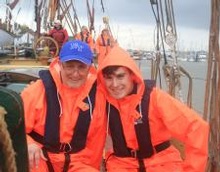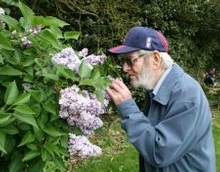Dementia Adventure gives back sense of adventure to dementia patients
Dementia Adventure gives people living with dementia that sense of adventure, that is often lost, when they get the debilitating condition.

The company organises holidays, which range from sailing trips on a barge to walking trips, cycling trips, abseiling trips and even kayaking and sea swimming trips.
Trips reduce levels of stress, anxiety and depression
People with dementia have said they have experienced reduced levels of stress, anxiety and aggression, improved sleep and heightened appetites after going on the trips.
Dementia Adventure also offers experiential learning programmes where they train up staff in care homes on how to offer their own dementia adventures.
Lucy Harding founded Dementia Adventure in 2009 with her husband Neil Mapes. Their background is in leading adventure travel holidays and Mr Mapes also has a background in clinical psychology and dementia advocacy.
“When we returned to Britain, Neil was very frustrated that there was so little on offer for people with dementia. He felt there was a lack of lovely things for people with dementia to do so we set up Dementia Adventure.
People with dementia can still enjoy life
“We want to show people that they can still enjoy life despite living with a debilitating disease.
“People with dementia may lose their mental and cognitive ability but they can still do physical activities but their partners or carers often feel unable to take them on trips or holidays so we offer them an alternative.
“People love it and we have had tears when it has ended. It makes it so special for them to be able to do things they thought they would never be able to do,” says Ms Harding.
The groups are deliberately kept very small and Dementia Adventure only takes four people with dementia plus their carers and four volunteers. Ms Harding has found going on dementia adventures can really lift the spirits of people with dementia. “There are so many benefits to getting out and going on trips. I often find people with dementia miss going outside especially when they are in a care home as they do not have the same opportunities to go out.”
Important to connect people with dementia with nature
Dementia Adventure is a keen advocate of connecting people with nature. Agnes Houston, chair of the Scottish Dementia Working Group and a council member of Alzheimer Scotland, has gone on Dementia Adventure trips and has found the woodland trips have had a “profoundly positive effect”. She says: “Nature is a great healer, it soothes you, it calms you, it makes you feel good about yourself.”
When it comes to remembering a woodland visit, she admits “the fact is, I won’t remember the place, but I will remember the smells and the sounds, which will trigger a memory that I had forgotten but that memory will trigger the feel-good factor and it will put the smile on my face and someone will say what’re you smiling about and I’ll think, you know I was at a place, I can’t remember where it was but oh…did I have a good time!”
Barchester care homes regularly use Dementia Adventure to take their residents on trips.
Hannah Mulholland, activities co-ordinator, for Harper Fields Care Home run by Barchester, went on a visit with residents to Ryton Sensory Gardens and found it to be extremely beneficial.
She says: “The benefits of the Sensory Gardens were extremely valuable, the herb gardens included several types of mint, apple mint, lemon mint, peppermint, and the residents’ favourite, pineapple mint, not to forget the other herbs, rosemary, thyme, marjoram and oregano to name a few.

“The sensory aspect of the residents rubbing their fingers over the furry/waxy leaves and smelling the sweet and strong aromas of the herbs was fascinating for the residents and prompted conversations of childhood meals and cooking for all the family.
“We were aiming to give the residents a sense of purpose, so we took information sheets with us that showed pictures of the different types of herbs for us to identify in the Sensory Garden. The residents enjoyed having a focus for the visit, this also helped the carers to keep drawing back to the aim when residents with dementia became distracted as to the reason for being there.”
On another trip to Coombe Abbey with Dementia Adventure, Ms Mulholland found ”the fresh air was extremely important for the residents as it brought back memories of certain smells that they would not come across in the care home setting.
“As we crossed the bridge over the lake we delved into the middle of the woods and saw many different types of trees and beautiful deep brown/red bark that fascinated the residents. The wonderful textures and ripples of the bark were extremely sensory for the ladies. We were fortunate with the weather as it had been raining an hour before we arrived and therefore the smells of the trees and woodland were phenomenal and made the whole experience that little bit more wonderful.”
The company recently managed to secure funding of £100,000 from the People’s Postcode Lottery.
Dementia Adventure is using this funding to build on its successful free Park Walks programme.
The ‘Walk and Talk Together’ programme is expanding to six new locations across the country this year.
Exercise vital to avoiding onset of dementia
Ms Harding says: “There is a building bank of evidence that exercise is vital both to avoiding the onset of dementia and also to delaying the worsening of the condition. Our walks can also give carers the opportunity to meet and gain support, as well as maybe walking the dog or bringing the grandchildren along. They can give a focus to the week and inspiration that it is possible to continue to live well with dementia.”
For more information on Dementia Adventure go to www.dementiaadventure.co.uk
Latest Features News
 25-Nov-19
2019 Election: Boris Johnson leaves social care in 'too difficult box' but Labour vows to end 'crisis'
25-Nov-19
2019 Election: Boris Johnson leaves social care in 'too difficult box' but Labour vows to end 'crisis'
 18-Oct-19
Podcast: Wendy Mitchell and dementia: 'My biggest fear is not knowing who my daughters are'
18-Oct-19
Podcast: Wendy Mitchell and dementia: 'My biggest fear is not knowing who my daughters are'
 27-Sep-19
Exclusive: Care minister backs care workers' call for time off to grieve and attend funerals
27-Sep-19
Exclusive: Care minister backs care workers' call for time off to grieve and attend funerals
 19-Sep-19
Podcast: Gyles Brandreth says poetry helps ward off dementia
19-Sep-19
Podcast: Gyles Brandreth says poetry helps ward off dementia
 30-Aug-19
Edinburgh Fringe funnyman joins comics facing toughest audience at care home gig
30-Aug-19
Edinburgh Fringe funnyman joins comics facing toughest audience at care home gig